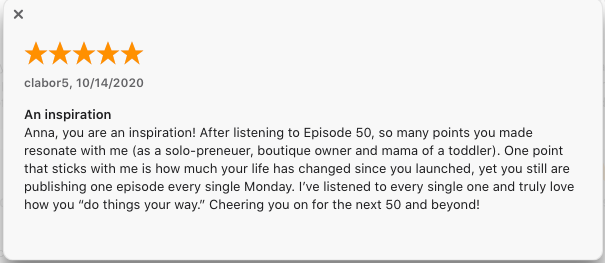LISTEN IN APPLE PODCASTS | LISTEN IN SPOTIFY | LISTEN IN STITCHER

Raise your hand if the recent changes to Instagram are making you a little crazy. It seems like every time I open up my favorite app, there’s a new feature – or something has changed or’s been moved around.
So – Last week, amid the funny Reels and stories about favorite Thanksgiving side dishes, I came across a post on Instagram that cut kind of deep.
I’ve definitely experienced Imposter Syndrome at different points in my life, but for the most part – I feel like I’ve had a good handle on it lately.
But what I didn’t realize is that Imposter Syndrome can show up in a number of different ways.

Photo Credit: Sarah Becker Photography
This week – I’m celebrating the one-year anniversary of launching It’s About Time.
I’m super excited about it, and honestly really proud to have taken something like this from an idea to reality – and then grow it to what it’s become a year later.
In the last year, I’ve published 57 episodes and 3 Bonus Episodes.
I’ve interviewed 26 remarkable women to learn how they approach work, life and balance and shared my best tips for time management and productivity in 29 solo shows and spent more than 37 hours behind my hand-me-down mic recording episodes.
And Yes, a year later I’m still using that same mic my friend Jacob is letting me “borrow.”
And yet – despite all of those numbers, I still struggle with a certain type of Imposter Syndrome at times. And if there’s one thing I’ve learned in the past year’s worth of episodes of talking with y’all – it’s that I’m not a lone, and We’re not along in our struggles.
So in Episode 57, I’ll cover
-
What exactly Imposter Syndrome is
-
5 different types of Imposter Syndrome, so you can put a more specific name to the feelings you’re having – learning these 5 types is what totally blew me away, because one of them really speaks to me, and you’ll get to find out which type speaks to you, too.
-
And finally 5 Ways to Manage Imposter Syndrome whenever you start to feel it creeping in
Studies have shown that 70% of people will experience at least one episode of Imposter Syndrome in their lives – so if you’ve never felt it, then you almost definitely know someone who has. Keep listening for ways to cope and to help others when they’re feeling it too.
Alright. Imposter Syndrome. Yikes. It just sounds rough on all accounts, right? And well – that’s because it is.
my most mortifying imposter syndrome moment
Back in 2015, I started a new job as a Public Relations Account Executive at a Boutique PR firm in New Orleans. Even though I’d worked in government communications, managing crisis situations on behalf of the Louisiana Lt. Governor, navigating droughts, oil spills, state budget issues and more – I still didn’t feel like I belonged at that firm.
Everyone else there had years of agency experience, and on top of that I had taken a pay cut from my past state government salaries to take this job and make the move to New Orleans – and so as a PR Exec, I was making about the same as what I made as an Executive Assistant much earlier in my career. Because of this drop in my salary, I didn’t feel valued – and I didn’t feel like my experience mattered.

I really hate to admit this and tell this story, but one of my clients flew in from Australia to meet with local elected officials about a plant opening. With my governmental relations background, I’d lined up a full day of meetings for him with everyone from State Reps, a U.S. Senator, Mayors and the Parish President. And for my Non-Louisiana listeners, just a reminder that Parish is what we call our Counties.
I knew my boss – the owner of the PR firm – was planning to attend the meeting with the Parish President, and I mentioned to my client that I might stay outside because I didn’t want there to be too many people there. I remember past bosses who were government officials – being perturbed when too many people were in the room for meetings. Honestly, I didn’t think that I would be able to contribute in a meaningful way, that I didn’t belong in the room and that I didn’t deserve a seat at the table. People who made what I made just didn’t get seats at the table. They sat along the back wall if they were even in the room at all.
But that client – his name was Matthew told me – “No, I need you to be in that meeting. You are our top contact. You’ve been engaging with all of these elected officials, you understand the landscape, you’ve spent years doing this. You don’t seem to understand how important you are to this operation and what expertise you bring to the table. We need you in there.”
I felt both grateful and totally mortified.
I was completely blind to my own worth and expertise, and was letting the years of agency experience I had (less than 1) and the number on my paycheck define my value – instead of the years of service I’d given to State of Louisiana, the experience I’d gained along the way, and my accomplishments – like the congressional testimony and speeches I’d written that had earned national media attention.
Imposter Syndrome? Oh yeah. 100%.
As I mentioned earlier, this episode was inspired by a series of Instagram posts by psychologist Dr. Kelly Vincent, and in those posts she references the work of Valerie Young who has studied Imposter Syndrome for decades – specifically fraudulent feelings among high achievers.
What is imposter syndrome?
So what exactly is Imposter Syndrome. If you know, you know – but if you’re not sure Imposter Syndrome is a struggle to internalize your own successes, or a collection of feelings of inadequacy that persist despite your success.
Basically – it’s feeling not good enough, like you don’t belong at the table, or like you’re a total fraud – even though there’s clear evidence – in the form of you having your job, or awards, or accolades, or just generally being competent.
It can take the form of
-
Doubting yourself
-
Berating your performance
-
Fear or failing
-
Over-achieving
-
Sabotaging your own success
-
Perfectionism
-
Over-preparing to make sure that no one finds out what a fraud you are
-
Denial of competence or rejecting praise
-
And of course this is not an exhaustive list.
Imposter syndrome can look different based on your personality, your background and your environment. And that’s exactly what blew my mind as I started to dig in and more about this all-too-common experience.
Imposter Syndrome can look different for everyone, and Dr. Valerie Young’s research uncovered 5 different types of Imposter Syndrome.
5 Types of Imposter Syndrome
Now – before I tell you about each one, I want to mention something that Dr. Kelly Vincent mentioned in one of her Instagram posts showcasing these 5 types.
She said that – and i quote “In my opinion, these types are not meant to label or diagnose yourself. Instead, they can be helpful in building awareness of your experience and the underlying belief systems.”
When it comes to overcoming fraudulent feelings, Dr. Young – the original researcher – highlights the need to uncover your self-limiting beliefs about competency.

So -as you’re reading each of these five types, instead of thinking “Oh I’m totally this one” or trying to diagnose yourself, try to frame it as – Okay – I can bring awareness to this type of behavior when I recognize myself falling into these patterns.
Alright – Are we on the same page? Let’s look at the five types of imposter syndrome. I’ll share all five, and then give you a short description of each.
-
The perfectionist.
-
The superhero.
-
The expert.
-
The natural genius
-
The soloist.
First – The Perfectionist
Perfectionists are never satisfied and always feel that their work could be better. Rather than focus on their strengths, they tend to fixate on any flaws or mistakes. This often leads to a great deal of self-pressure and high amounts of anxiety.
Next – The Superhero
Because these individuals feel inadequate, they feel compelled to push themselves to work as hard as possible. They measure competence based on how many roles they can both juggle and excel in. Falling short in any role evokes shame, because they feel like they should be able to handle it.
Third – The Expert
These individuals are always trying to learn more and are never satisfied with their level of understanding. Even though they are often highly skilled, they underrate their own expertise. Their primary concern is “what” and “how much” they know or can do. Even a minor lack of knowledge creates feelings of failure and shame.
Fourth – The Natural Genius
These individuals set excessively lofty goals for themselves, and then feel crushed when they don’t succeed on their first try.
And finally – The Soloist
These people tend to be very individualistic and prefer to work alone. Self-worth often stems from their productivity, so they often reject offers of assistance. They tend to see asking for help as a sign of weakness or incompetence.
What was so interesting to me about learning about each of these types is that each of them deals with, or attempts to fight back against imposter syndrome in a unique way. I’ve typically thought of imposter syndrome as just feelings of inadequacy… But I can look back across the past 10 years and see how imposter syndrome has played out with these different types.
In college and my early professional career – I can clearly remember having Superhero Tendencies, running from one meeting to the next and applying for more and more clubs and committees just to prove that I was good enough. I like to say that I’m a recovering perfectionist, and I try to employ the strategy of defining what “Good Enough” or “B minus” work looks like – a strategy that will sound familiar to any of my time management coaching clients listening in – but I still struggle with fixating on mistakes instead of letting it go and remembering that perfection in anything is truly impossible. But reading the description of The Expert type is what hit the hardest.
I mentioned in Episode 50 that I’ve struggled with the word expert, and questioned what it means to achieve expert status. What does knowing enough look like? And I see now that was the Imposter Syndrome talking – questioning the hours I’ve put in to learn as much as possible about time management, productivity, work life balance and business – but it still never feeling like it’s enough.
5 Ways to Deal with Imposter Syndrome

So what do we do when we feel the feelings of Imposter Syndrome creeping in?
Although there are many different methods to approaching imposter syndrome, I’m going to share 5 ways that you can manage imposter syndrome and encourage you to follow Dr.KellyVincent on instagram to learn more.
First – Normalize your feelings. Remember – around 70% of us will experience imposter syndrome at some point, so you are not alone.
Second – start attributing your success to YOU. Your hard work, your dedication, your persistence, your education – whatever it took. You weren’t just lucky, you weren’t just in the right place at the right time – you earned your success. Let yourself own it.
Third – Work on developing a healthy response to failure. Let’s be honest. Failure sucks. No one LIKES to fail. But it happens. We’re just not going to get everything right all the time. The buyer will choose another realtor. You will lose out on the RFP. You might even get fired, mess up the presentation or bungle the project.
Instead of rehashing your mistakes – and I know we all love to stay up at night reliving that awkward conversation or that moment we fell walking on stage – think about what you’d do differently next time, or use try this:
Fourth – Recognize and reframe the story – how can you reframe the failure into a lesson or opportunity for growth? How can you recognize when you’re displaying the tendencies of one of these 5 types and reframe – maybe even pivot to a different behavior?
And finally – Fifth – remind yourself, “I am a work in progress.” Y’all – every single one of us is a work in progress. Every day we’re learning new things, taking in new experiences and building our personal portfolios of life. It doesn’t matter how old you are, how long you’ve been in business, how long you’ve been in your career – No one – literally not a single person has everything figured out. We are all works in progress, and I don’t know about you, but that is just so comforting to me.
So next time you feel yourself slipping into your version of imposter syndrome, i encourage you to try one or more of these 5 methods for managing those feelings, and remember that repetition is key. This isn’t a one and done, set it and forget it fix. Just like anything worthwhile, managing imposter syndrome takes awareness, and it takes practice.
Final Recap
So – to run through those quickly one more time:
-
Normalize your feelings. Remember that you are not alone.
-
Start attributing the success to YOU! Give yourself credit where credit is due.
-
Work on developing a healthy response to failure. What can you learn from it?
-
Recognize and reframe the story.
-
Remind yourself, “I am a work in progress.”
LISTENER SPOTLIGHT

First of all – Thank you so incredibly much for your kind words. It means so much to me that you’d let me be a part of your week while you’re running your business, helping customers and chasing a toddler. I seriously started crying when I read this review because when you’re behind the mic, sometimes it feels like taking a big guess. Will this be helpful? Will you guys like this episode? So I can’t tell you how meaningful it is to get this feedback from you. Thank you so so much for taking time to leave this review – it’s definitely fuel to the fire to keep me going for the next 50 episodes and the next year and beyond.
SUBSCRIBE & REVIEW IN ITUNES
If you’re enjoying It’s About Time so far, I hope you’ll take a moment to subscribe if you haven’t yet – I don’t want you to miss an episode! I’ve got a few bonus episodes in the works, and you might miss them if you’re not subscribed. Click here to subscribe on iTunes.
If really like what you hear, I’d be so grateful if you left me a review over on iTunes, too. Your review play a HUGE role in helping others find out about It’s About Time. And honestly, they’re really fun for me to read! Click here to review, select “Ratings and Reviews” and “Write a Review” and let me know what you’re loving about It’s About Time. Thank you!!
LINKS & RESOURCES MENTIONED IN THIS EPISODE
LISTEN
JOIN
-
Join the It’s About Time Podcast Community!
Be the first to comment